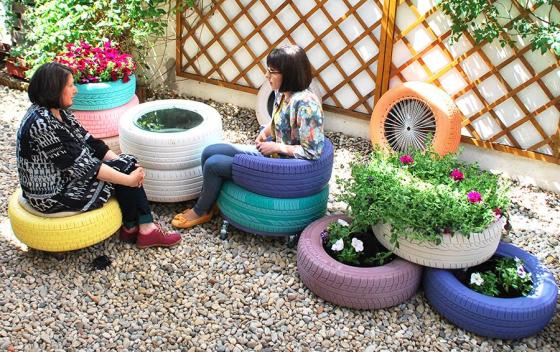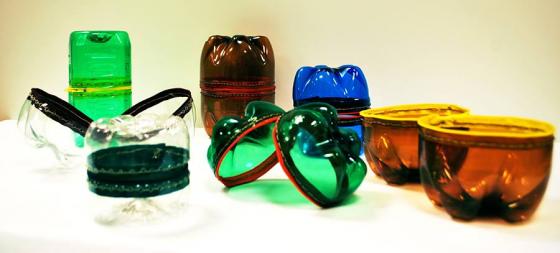Available in: ![]() English /
English / ![]() Romanian
Romanian
 English version
English version
My name is Irina Breniuc. I’m a journalist specialized in sustainability. But it is not as a journalist that I want to address you now. Instead, I want to share some of my experience as the initiator of a crazy idea that has not yet entered the Romanian market: crafting furniture and accessories out of scrap tyres and other garbage. We’re known as PIMP the GARBAGE and you can find us on Facebook.

Recently, I’ve been told to be one of the 5 Romanians doing upcycling. Of course, that was an exaggeration. There are plenty of people doing it, more or less formally. The question is: is the Romanian market ready to welcome us?
But until I find that out from you, let me tell you what is upcycling in my opinion, how you deal with it and what are the main challenges when doing it.
###Upcycling, more than recycling
Upcycling. A concept without an equivalent in Romanian. I’d say it is, most of the time, the innovative “revaluation” of waste. Others name it “creative recycling”.
Whatever the name, one thing is certain: unlike traditional recycling methods, that comprise of breaking the waste into pieces with a lower value than the initial object, upcycling adds value by transforming the waste into new objects. To make it clearer, I shall give you an example: turning plastic bottles into PET flakes is seen as recycling, but turning them into pencil boxes is upcycling.

You minght wonder if Romanians upcycle. Yes, they do. PIMP the GARBAGE is just an example. However, we should also mention Ateliere Fără Frontiere, who repair and recycle old IT components and make bags out of advertising banners; UpsideDown do the same with banners in Iasi. ReciclareCreativă upcycle all sort of packaging waste, and PinkLime uses recycled styrofoam to make beanbags. There’s also Uleiosul, who plans to make biofuel out of recycled oil.
So, we don’t lack initiatives. But how hard is it to set them up and make them work?
###How do you deal with upcycling
Haven’t found an answer yet. However, patience must be used as a weapon. Why? Because it’s a new domain and any new domain, there are tons of unanswered questions.
But, one step at a time. You plan to upclycle? Then, one of the first things you must decide upon is what sort of legal entity you want to be. Are you considered to be a social enterprise, as you protect an important stakeholder – the environment? Or, in order to be a social enterprise you must help people? Are you under the Social Economy Law that has just been voted or not?
For now, you can either bean NGO, or a SRL: an NGO if you want to protect the environment more than to make money and a SRL if it’s the other way round. Or you can set up both, in order to better adapt to different sort of situations.
Althought consistent, setting up an enterprise is just the first step. Next stop: getting permits to produce. From whom? The Environment and the Economy Ministry, in our case, but it might depend.
With PIMP the GARBAGE, we have the following dilemma: should we declare we want to use scrap as such or that we want to recycle it? The first scenario might not be applicable, as we don’t used recovered objects with the same purpose. The second one is, however, hard to comply with: in order to be a recycling entity, you must have recycling facilities that are way too expensive.
So, the best solution might be to identify waste that has not yet been declared waste and use it.
We’re not the only ones in this situation. We hope together we can find the best solution.
###Other upcycling challenges
Once you’ve got out of the administrative chore, you must deal with the challenges a normal businessperson has to deal with. The most important one: financing the business. In order to provide the sufficient initial capital for your business to take off, you have 2 options: fundraising and sales.
If you intend to get external financing for an upcycling business, you’ll have to persuade CSR officers’ or other social investors’ that what you plan to do is worth investing in. Because, what they’ll be asking themselves is: what kind of NGO are you if you don’t’specifically aim at helping people in need? Definitely, environmental concers will never be as catchy and newsworthy as taking care of children with cancer. However, it mustn’t be. There’s enough for both. We just have to find a way to share resources.
When you plan to sell to mass-market or other consumers, you find yourself obliged to explain why an upcycled product made out of waste is more expensive than one that has the same purpose, but it’s mass produced. Romanians have a difficulty in understanding and appreciating the value you bring to a garbage, turning it into something useful. They can’t picture the whole process: cleaning it up, setting it up, painting it, preparing the auxiliary materials, manufacturing etc. All by hand. All this requires time and effort. Which costs. Therefore the high price.
That is why I am asking: are you really willing to buy upcycled products? Will you pay a bit more for a product that is causing less harm on the environment? Moreover, do you believe companies and other social investors are willing to invest in upcycling?
These are the questions I invite you to answer, in the comments area or maybe face to face, during the FutureSpotters workshop. Hope to see you soon!
Mă numesc Irina Breniuc şi sunt jurnalistă specializată pe sustenabilitate. Dar nu ca jurnalistă vă scriu. Ci ca iniţiatoare a unei idei nebune, încă nepătrunsă pe piaţa românească: producţia de mobilier şi accesorii din anvelope uzate şi din alte deseuri. Ni se zice PIMP the GARBAGE şi ne găsiti pe Facebook.
Recent, mi-a spus cineva ca aş fi una dintre cele 5 persoane din România despre care a aflat că face upcycling. Evident, e o exagerare. Mai fac mulţi altii. Întrebarea este însă dacă piaţa e pregatită să ne primească.
Dar până să aflu asta de la voi, hai să vă spun ce e pentru mine upcycling-ul, cu ce se mănâncă şi cu ce probleme se confruntă.
###Upcycling, reciclare la pătrat
Upcycling. Iată un concept căruia nu am reuşit să îi identific un echivalent în limba română. I-aş zice revalorificare, de cele mai multe ori, inovativă, a deşeurilor. Alţii o numesc reciclare creativă.
Oricum i-am zice, un lucru e însă cert: spre deosebire de metodele tradiţionale de reciclare, prin care deşeurile sunt descompuse în elemente cu o valoare mai mică decât cea iniţială, upcycling-ul presupune transformarea deşeurilor în obiecte cu o valoare mai mare. Ca să fie mai clar, voi da un exemplu: transformarea unui PET în fulgi ţine de reciclare, însă transformarea lui într-un penar e deja upcycling.
Vă întrebaţi poate dacă se face upcycling la noi. Da, se face. PIMP the GARBAGE este doar un exemplu. Mai sunt cei de la Ateliere Fără Frontiere, cu un proiect de revalorificare a calculatoarelor vechi şi cu unul de transformare a bannerelor publicitare în genţi şi materiale promoţionale; tot de bannere “au grijă” şi cei de la UpsideDown, în Iaşi. Cei de la ReciclareCreativă se ocupă cu reciclarea deşeurilor de ambalaje, iar cei de la PinkLime folosesc polistiren expandat reciclat în producţia de beanbag-uri (fotolii de tip puf). Mai este şi Uleiosul, care plănuieşte să facă bio-combustibil din uleiul uzat colectat.
Iniţiative, aşadar, există. Cât de greu e însă oare să le porneşti şi să le susţii?
###Cu ce se mănâncă upcycling-ul
La această întrebare nu am găsit încă un răspuns. Aş glumi spunând că se consumă cu răbdări prăjite. De ce? Pentru că domeniul e nou, iar, într-un domeniul nou, întrebările sunt multe şi răspunsurile - puţine.
Dar, să o luăm cu începutul. Vrei să faci upcycling? Atunci, printre primele decizii pe care trebuie să le iei este ce formă juridică să alegi. Eşti oare considerat întreprindere socială, din moment ce protejezi prin activitatea ta un stakeholder important pentru societate, respectiv mediul înconjurător? Sau e musai ca o întreprindere să ajute o categorie defavorizată de oameni ca să fie considerată întreprindere socială? Ni se vor aplica sau nu prevederile Legii Economiei Sociale, care a fost votată de Parlament, după vreo 3 ani de zile de dezbateri?
Deocamdată, poţi fi fie ONG, fie SRL: ONG dacă vrei să faci upcycling mai mult pentru mediu decât pentru profit şi SRL dacă ceea ce îţi doreşti e să obţii un profit pe care să-l foloseşti cum ai chef. Sau ambele, pentru a “jongla” (a nu se citi “fenta”) mai uşor cu sistemul.
Deşi consistentă, înfiinţarea e doar primul pas. Urmează obţinerea avizelor. Prima întrebare pe care ţi-o pui este, evident, de la cine. Ministerul Mediul şi Ministerul Economiei, în principiu. Însă, obţinerea lor depinde de la caz la caz. De ce? Pentru că upcycling-ul nu prea poate fi încadrat în legislaţie.
În cazul PIMP the GARBAGE, există următoarea dilemă: ar trebui să declar că vreau “să folosesc ca atare” anvelopele uzate sau că vreau “să le reciclez”? În primul caz, mi se va spune, cel mai probabil, că nu e bine, căci nu le folosesc în acelaşi scop. În cel de-al doilea, mi se va cere să fac dovada unei platforme betonate de dimensiuni mari, a unor utilaje de reciclare şi a unor maşini pentru transport.
Însă, e posibil ca răspunsul să fie: “nici una, nici cealaltă”. Posibil să fie necesară găsirea unei variante care să îmi permită să preiau deşeuri fără să fiu colector sau reciclator. Iar pentru aceasta, trebuie să preiau deşeul înainte ca acesta să fie declarat deşeu.
În situaţia noastră sunt şi alţii. Avem însă încredere că vom putea depăşi aceste dificultăţi.
Alte probleme de upcycling
După ce ai scăpat de corvoada administrativă, ai de înfruntat provocările unei afaceri normale. Trebuie să te finanţezi, iar, pentru asta, ai 2 opţiuni: fundraising şi vânzări.
Dacă vrei să obţii finanţări pentru o afacere de upcycling, te vei lovi de reticenţa responsabililor de CSR din companii şi a altor finanţatori de a înţelege scopul social al iniţiativei. Ce fel de ONG sau afacere socială eşti tu dacă nu îţi propui să ajuţi persoane defavorizate? Protejarea mediului nu va fi niciodată la fel de emoţionantă ca îngrijirea copiilor cu cancer. Şi nici nu trebuie să fie, căci resurse se găsesc pentru ambele. Important e să ştim cum să le gestionăm.
Când vine vorba despre vânzarea către consumatori, te afli în situaţia de a explica de ce un produs obţinut dintr-un deşeu, un material relativ ieftin, este mai scump decât un produs de masă care îndeplineşte un rol similar. Consumatorului român îi vine destul de greu să înţeleagă valoarea suplimentară pe care i-o aduci tu deşeului. Nu se gândeşte că, pentru a transforma o anvelopă într-un scaun, trebuie să o cureţi, să dai zeci de găuri, să o vopseşti, să pregăteşti materialele auxiliare şi să îi confecţionezi, cu răbdare, şezutul. Totul manual. Iar asta necesită timp şi efort, iar timpul şi efortul costă. Prin urmare, costurile se regăsesc în preţ.
De asta vă întreb: sunteţi într-adevăr dispuşi să cumpăraţi produse obţinute din deşeuri? Sunteţi dispuşi să plătiţi uşor peste medie, pentru a achiziţiona un produs local reciclat? Şi cât de doritoare credeţi că ar fi companiile sau alţi finanţatori să o facă?
Sunt întrebările la care vă invit să răspundem, dacă vi se par de interes, la una dintre sesiunile workshop-ului FutureSpotters. Să ne vedem cu bine!